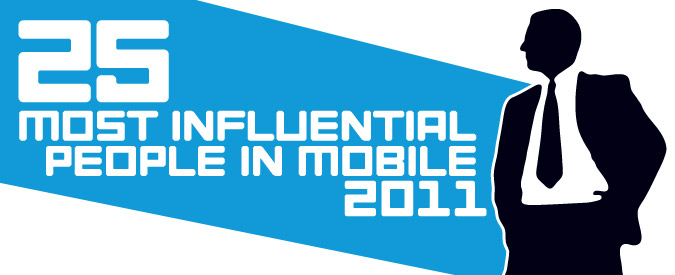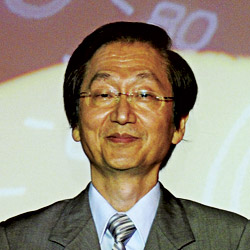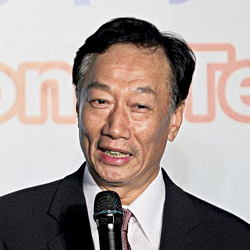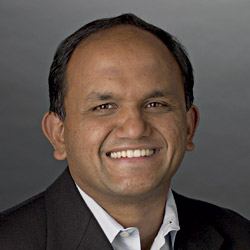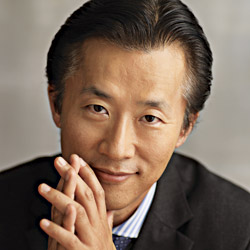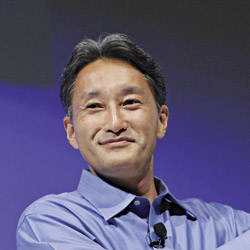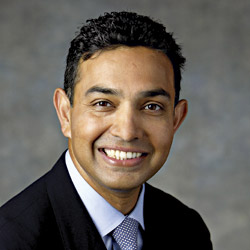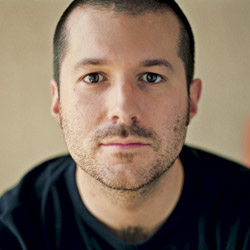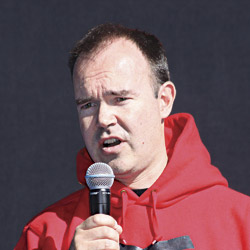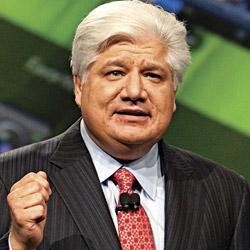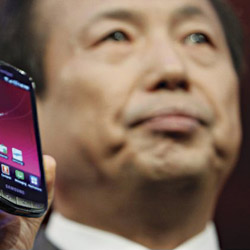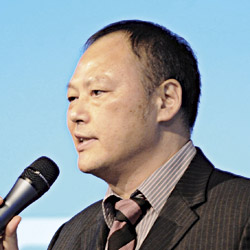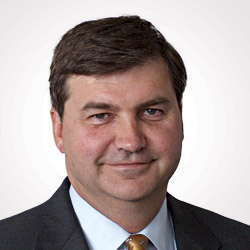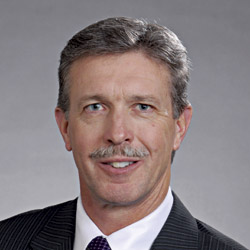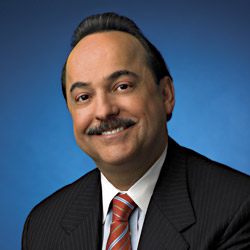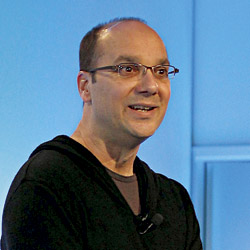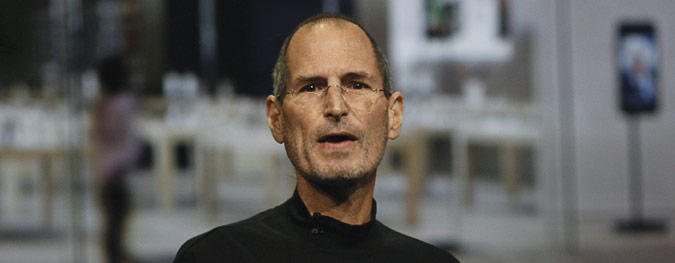25 Most Influential People In Mobile 2011
The past year has been pivotal for mobile tech. From the introduction of the iPad 2 and Android’s continuing momentum to Nokia’s surprising wholesale jump and Microsoft’s Windows Phone 7 OS, it has certainly been a busy 12 months.
Thousands of talented company employees are responsible for the design, production, manufacturing, and sales of successful products. Narrowing this pool down to a group of just 25 key leaders was a tough job. But it’s clear that their drive and vision have provided direction in the hottest segment of the tech industry. The rest just follow along. Without further ado, here is LAPTOP’s fourth-annual list of the 25 most influential people in mobile technology.
25. Johnny Shih
Chairman and CEO, ASUS
ASUS practically invented the netbook industry under Shih’s direction a few years ago. And the company is still a major player, even as tablets begin to steal the spotlight. Shih is taking direct aim at the iPad and other Honeycomb tablets with its aggressively priced and versatile Eee Pad Transformer, a tablet that docks into a keyboard.
Sign up to receive The Snapshot, a free special dispatch from Laptop Mag, in your inbox.
24. Mike McCue
CEO, Flipboard
Boasting integrated social networking, sharing, and beautiful layouts, Flipboard has inspired a rash of copycat apps; clear-cut evidence of McCue’s success in delivering an enhanced magazine-like experience. Flipboard recently raised $50 million, giving the start-up a $200 million valuation. Sound high for an app with no clear revenue model yet? Given that McCue sold TellMe to Microsoft for $800 million, we certainly wouldn’t bet against him.
23. Terry Gou
Chairman and president, Foxconn
Foxconn is the most important electronics manufacturing company you’ve probably never heard of. It produces everything from iPhones to Dell computers and Sony video game consoles. Chairman Terry Gou has come under fire for poor conditions across the company’s 20-plus factories in China, but he’s pushing ahead into new territories. Reports say Gou is expanding into Brazil to make Apple products, a $12 billion investment over five years.
22. Shantanu Narayen
CEO, Adobe Systems
Shantanu Narayen has become somewhat of a punching bag for Flash’s bugginess and slow performance. But his company is fighting back with Flash Player 10.2 for mobile, which should bring a smoother experience to tablets and phones. Meanwhile, many are embracing the company’s AIR platform for developing mobile apps on Android and the BlackBerry PlayBook. But Narayen also needs to be nimble, which is why he’s rolling out a Flash-to-HTML5 conversion tool for developers and designers.
21. Jeff Hwang
President, LG Mobile Phones
LG’s mobile division has slipped in recent years, as it jumped on the smart phone bandwagon too late. A late surge in shrewdly designed, budget-priced Android handsets, dubbed Optimus, has helped LG gain a stronger presence on major U.S. carriers. Now Hwang is setting his sights on the higher end with the T-Mobile G-Slate (the company’s first Honeycomb tablet) and dual-core–powered G2x phone.
20. Joe Belfiore
Corporate vice president, Windows Phone Program
The man behind the slick Windows Phone 7 software (being adopted by Nokia) has earned kudos for its fresh interface and unique features such as Xbox Live games. But Microsoft must still push upstream against such already-established juggernauts as Apple and Google. To do that successfully, Belfiore and his team is readying Mango, the codename for a major update coming this fall that will bring a better browsing experience with IE 9, true multitasking, Twitter integration, and more.
19. Kazuo Hirai
President and group CEO, Sony Computer Entertainment
Can Kazuo Hirai make Sony a mobile force? The man behind the PlayStation brand has certainly enjoyed success with the PlayStation 3, and now that brand has penetrated smart phones with the new Sony Ericsson Xperia Play. The fact that Verizon Wireless picked up this handset tells you how much weight the PlayStation name carries—so much weight that many expect Hirai to eventually succeed Howard Stringer as Sony’s CEO. The company’s first Android-based tablet will reportedly be PlayStation-certified as well.
18. Sanjay Jha
Chairman and CEO, Motorola Mobility
Under Sanjay Jha, Motorola has turned its focus exclusively to Android-powered smart phones. This year, Jha’s team turned heads with the Atrix 4G, a phone that plugs into a laptop dock; and the Xoom, the first tablet to run Android 3.0. However, Motorola will need to do a lot more to compete with HTC, Samsung, and other Android partners. Perhaps not content with the differentiation the Motoblur service gives him on top of Google’s software, Jha is rumored to be hiring engineering talent to forge an entirely new mobile OS.
17. Marissa Mayer
Vice president of location and local services, Google
Could Google finally help consumers in the U.S. use their phones as wallets? Yes, if Marissa Mayer has a say in it. A driving force behind the expansion of mobile apps such as Maps and Search, Mayer is reportedly working with Verifone to launch mobile payment trials in New York and San Francisco using Near Field Communication technology. Making consumers comfortable with the idea of ditching their credit cards is no small feat, so Mayer will need to make it as easy as it is secure.
16. Jonathan Ive
Senior vice president of industrial design, Apple
It’s no small feat to design products that end up in New York’s Museum of Modern Art and the Pompidou in Paris. Jonathan Ive first rose to prominence by designing the original Bondi Blue Apple iMac, at a time (mid-1998) when design was still far from the number one consideration when it came to desktop PCs. Today, his work speaks for itself: Ive and his design team continue to create products that consumers covet—and that make the competition look dated—including the glass-and-steel iPhone 4 and the impossibly svelte MacBook Air. Then there’s the iPad 2, which is so thin and light that it caused a Samsung executive to call his own tablet inadequate.
15. Stephen Elop
CEO, Nokia
Nokia has held onto the title of number one cell phone manufacturer in the world for years, but it has failed to compete with Android and iOS smart phones—especially in the U.S. Now here comes the Hail Mary pass: As Nokia’s new CEO, former Microsoft exec Stephen Elop is betting the farm on Windows Phone as the Finnish giant’s premier platform. Given that Microsoft’s OS has seen a slow start, it’s hard to believe this software will be a panacea. But if Elop can combine Nokia’s top-notch hardware with a more robust version of Windows Phone, he might make the naysayers eat their words.
14. Mikael Hed
CEO, Rovio Mobile
Who hasn’t heard of Angry Birds? The addictive flick-a-bird-at-pigs game surpassed 100 million downloads in March, and the company is earning at least $1 million per month in ad revenue from the Android version of its app. Yup, Rovio CEO Mikael Hed is riding a tidal wave, complete with a successful port of the Angry Birds franchise to the Mac App Store and a special tie-in version for the movie Rio that racked up 10 million downloads in 10 days. There’s even a line of merchandise, with more than 60,000 plush toys sold. Next up: Facebook and console versions, as well as TV shows and movies. Hed has likened Angry Birds’ influence to Steamboat Willie and the start of Mickey Mouse. He might not be that far off.
13. Matias Duarte
Director of Android user experience, Google
Android isn’t exactly known for its elegant interface, which is why Android 3.0 is such a huge departure. It marries a futristic design with lots of 3D effects and interactive widgets, as well as a thoughtful notfication system. The man behind Honeycomb is Matias Duarte, who also designed Palm’s webOS. From what we’ve seen so far, he has provided Google’s partners a real shot at catching up with the iPad. The challenge for Duarte will be getting Honeycomb—or a variation on the theme—to work on a smart phone’s smaller screen.
12. Andrew Mason
CEO, Groupon
Launched in November 2008, Groupon’s 900-plus daily deals and social network-enabled coupon site now reach more than 70 million consumers in 45 countries. The company makes money by keeping a portion of the revenue businesses earn from the group-based coupon deals. Mason’s outfit is on track to generate $3 to $4 billion this year, up from $750 million in 2010. No wonder the 30-year-old reportedly turned down a $6 billion buyout offer from Google. He has his eyes set on an IPO that would value the company at $25 billion. Mason’s mission for this year: to fend off direct competitors such as LivingSocial and keep businesses and customers coming back after the novelty of daily deals wears off.
11. Mike Lazaridis
Founder and co-CEO, Research in Motion
Android has put Mike Lazridis on the defensive, but RIM’s co-CEO is going on offense with the new PlayBook tablet. Despite a lukewarm reception by critics, the slates’s new multitasking-friendly, multicore-optimized ecosystem forms a solid foundation RIM’s future tablets and also phones. In the meantime, RIM’s BlackBerry OS 6.1 promises some major changes of its own, including support for mobile payments via NFC. Even after losing market share to Android, RIM still commands a hefty 27 percent of U.S. sales. If Lazaridis and his charges can convince developers that BlackBerry is still viable, RIM will be able to stay in the game.
10. JK Shin
President, Samsung Mobile
With its eye-popping Super AMOLED screens and fast performance, Samsung’s Galaxy S line of high-end Android smart phones has given every major U.S. carrier a device that rivals the iPhone 4. And JK Shin, president of Samsung Mobile, is leading the charge. His company currently sells nearly one out of every four mobile phones in the U.S.
Now Shin and his team are readying a one-two counterpunch for the iPad: the Galaxy Tab 8.9 and 10.1. Shin also says that Samsung plans to triple the number of smart phones sold this year to 60 million. Apple has certainly noticed Shin’s success. The company recently filed a patent infringement suit against Samsung.
9. Phil Carmack
Senior vice president, mobile business unit, Nvidia
Nvidia saw the mobile writing on the wall long ago, and has since muscled its way into 40 percent of notebooks. But that’s not what’s propelling the company’s growth for the next three to five years. The company’s new Tegra 2 processors power a new wave of superphones such as the
T-Mobile G2x, which is capable of 1080p video recording and playback. Plus, Tegra is the CPU of choice, thus far, for Android 3.0 tablets.
At Mobile World Congress in February, Phil Carmack, senior vice president of Nvidia’s mobile business unit, demoed a new chip, codenamed Kal-El. It features a quad-core CPU and a 12-core GPU that could leave competitors in the dust. The chip can even deliver smooth video playback at up to 2560 x 1600-pixel resolution. The first Kal-El devices will ship this August.
8. Peter Chou
CEO, HTC
This is how well Peter Chou is doing at HTC: In April his company surpassed Nokia in terms of market capitalization with $33.8 billion. Today more than one in five U.S. cell phone shoppers buy a device made by HTC. Built on the strength of top-notch industrial design and smart software, HTC is now a consumer-recognized brand that rivals Motorola and Samsung. Led by Chou, HTC’s sophisticated Sense UI for Android gives this company’s phones a level of polish that only Apple can match.
The next frontiers for HTC are making Sense even smarter with a totally revamped lock screen and new movie download service. Chou and is team is also readying the EVO View for launch, an Android 2.3 tablet that works with a digital pen and automatically syncs your notes to the cloud.
7. Todd Bradley
Executive vice president, personal systems group, HP
It’s not easy being at the helm of the world’s largest PC vendor, but during his five-year tenure Todd Bradley has increased profitability threefold while adding more than $10 billion in revenue. But staying ahead of Acer and Dell in notebooks is nothing compared to Bradley’s next challenge: scaling webOS to compete with the likes of Android and iOS.
Working with ex-Palm CEO and now HP senior vice president Jon Rubinstein, Bradley and his team will need to justify HP’s $1.2 billion purchase of Palm. The first fruits of the partnership will be two new smart phones and the new TouchPad tablet this summer. He has also promised to add webOS to every PC HP sells starting next year. Bradley recently said that webOS is “an opportunity to leapfrog the traditional Wintel ecosystem,” but only if consumers—and developers—give a much warmer reception to the platform compared to the last time around.
6. Dan Mead
President and CEO, Verizon Wireless
Score one for Mead in getting the iPhone. In February, Verizon Wireless became the second major carrier in the U.S. to sell the iPhone 4, ending AT&T’s former exclusive. At the Verizon Wireless iPhone 4’s introduction, Mead shared the stage with Apple COO Tim Cook; not surprisingly, the device was the top-selling phone on any carrier during its first month on store shelves. Mead says that the carrier will sell 11 million iPhones alone in 2011, which we presume will also include the iPhone 5. But thawing relations with Apple isn’t the biggest story here.
Mead has spearheaded Verizon Wireless’ 4G LTE network, which offers the fastest speeds of any carrier. Currently, customers can achieve blazing-fast downloads (5 to 12 Mbps) and uploads (2 to 5 Mbps) in 39 markets covering 110 million people, and Verizon Wireless promises to blanket 147 markets by the year’s end. There was such pent-up demand for the carrier’s first 4G phone, the HTC Thunderbolt, that it reportedly outsold the iPhone 4 in several of the carrier’s stores. Which just goes to show, it’s all about the network.
5. Paul Jacobs
Chairman and CEO, Qualcomm
Qualcomm’s FLO TV initiative may have flopped, but thanks to Jacobs, the company’s first- and second-generation Snapdragon processors have become the brains behind many high-end Android smart phones. One version on the horizon clocks in at 2.5 GHz, comes with up to four cores, and consumes 65 percent less power than current ARM-based CPU cores. Qualcomm’s dominance isn’t just about speed; for example, the latest Snapdragon CPUs are now compatible with NFC and stereoscopic 3D, two emerging mobile technologies that will gain a lot of momentum in the coming months.
Jacobs is also making a big push into tablets; you’ll find Qualcomm’s dual-core Snapdragon CPUs inside the upcoming HP TouchPad and the ASUS Eee Pad Memo. While the majority of Qualcomm’s revenue comes from its core chipset business, Jacobs continues to branch out. The company is currently investing in daylight-friendly Mirasol displays and recently acquired Wi-Fi powerhouse Atheros.
4. Ralph de la Vega
President and CEO, AT&T Mobility
$39 billion. That’s how much AT&T paid to get its mitts on T-Mobile’s customers and, more importantly, its spectrum. Assuming the FCC approves the combined entity, Ralph de la Vega will preside over the nation’s largest carrier, gobbling up an additional 34 million subscribers. Having T-Mobile under its umbrella will allow AT&T to expand its LTE deployment, which could help the company catch up in the 4G wars.
AT&T says this combo will increase network density by approximately 30 percent in some of its most populated areas, while avoiding the need to construct additional cell towers. In other words, expect fewer dropped calls and better data performance. While AT&T CEO Randall Stephenson brokered the deal with Deutsche Telecom, it will be up to de la Vega to execute this integration and make this denser grid a reality for increasingly data-hungry customers. It will also be up to the AT&T Mobility CEO to decide which devices make the cut, giving this megacarrier a whole lot of clout—maybe too much—with manufacturers and consumers.
3. Mark Zuckerberg
President and CEO, Facebook
Based on sheer screen time and media coverage, sometimes it’s tough to tell who is more popular these days: Steve Jobs or Mark Zuckerberg. After all, Jobs’ main motion-picture presence is Noah Wyle’s portrayal of him in the late-90s cult film Pirates of Silicon Valley. Meanwhile, the 27-year-old Zuckerberg got the full-on Hollywood treatment in The Social Network, complete with $97 million in U.S. box office sales and eight Academy Award nominations.
Facebook has become ubiquitous not only for staying in touch with long-lost friends and family, but also for casual gaming, scheduling events, and promoting brands both big and small. The company has more than 600 million active users, and at least 200 million of those access Facebook via mobile devices. Zuckerberg was named Time’s 2010 Person of the Year, but he has also taken some heat for Facebook’s handling of various privacy and security breaches.
Still, the future looks bright for Facebook, which passed the 500-shareholder mark at the start of 2011 ahead of a rumored IPO in 2012. The company has rolled out deals and check-ins to keep up with the likes of Foursqaure and Groupon, and it’s working with HTC to launch Android smart phones with more tightly integrated Facebook services. Add all this up, and Zuckerberg could single-handedly spark another dot-com boom.
2. Andy Rubin
Vice president of engineering, Google
When the first Android-powered T-Mobile G1 hit in 2008, not everyone was convinced that Google had a good enough product to challenge the iPhone. That’s ancient history now. By rolling out regular software updates with meaningful enhancements and enabling a steady stream of high-quality devices from several partners, Andy Rubin has transformed Android into a powerhouse smart phone platform.
The Android Market now contains more than 200,000 third-party apps, and the latest Android phones offer mobile hotspot capability, Flash support, voice input, and smooth Facebook and Twitter integration. The OS has now captured a third of all smart phone sales in the U.S., up from 26 percent from last year. And much of that credit goes to Andy Rubin, the former CEO of Android, which Google acquired in 2005.
On the tablet front, Android 3.0 is a departure for Google, as the look and feel of the software is nearly identical from device to device. Some say this means that the platform is becoming less open, but Rubin is willing to risk the backlash in an effort to clamp down on fragmentation. He insisted in a recent blog post that Google’s compatibility requirements should not discourage its partners from customizing Android. But based on what we’re seen, it’s clear that Rubin is taking more control over his platform’s destiny.
1. Steve Jobs
Chairman and CEO, Apple
Few visionaries have earned the title like Steve Jobs has. Android may be just passing iOS in popularity in U.S., but Apple has created a tablet industry out of thin air with the iPad, which is already on its second edition as dozens of clones struggle to catch up to the original. The company sold nearly 15 million iPads in 2010, and analysts expect Apple to command at least 70 percent market share in 2011. Thanks to Jobs’ leadership, Apple has also paid out $2 billion to app developers thus far and has surpassed 65,000 apps just for the iPad. The company also boasts more than 200 million iTunes accounts, through which users can buy apps, books, movies, music, and TV in a one-stop shopping environment that no one else has been able to replicate.
When Jobs returned to Apple in 1997, the company was adrift in a sea of Mac look-alikes and flat sales figures. Today, following the success of the iPod, iPhone, and iPad, the company boasts a market cap of $311.4 billion (as of press time), putting it ahead of archrival and PC juggernaut Microsoft. And although Jobs keeps on saying that we’ve entered the post-PC era, Apple’s Mac sales are up 20 percent this year. And Mac OS X Lion (debuting this summer) will sport many iPad-like features, including not only an app store but richer multitouch gestures.
Of course, there’s also Tim Cook, the man who has covered for Jobs several times as acting CEO during his illness-related absences and has had significant behind-the-scenes influence in keeping suppliers in line. But it’s the 56-year-old Jobs who seems to provide the vision and focus for all that Apple does, and it’s his passion that fuels the only brand whose products shoppers are willing to stand in line to get their hands on.
